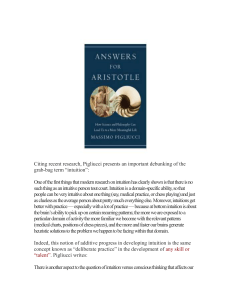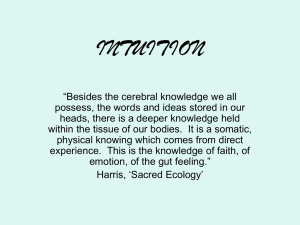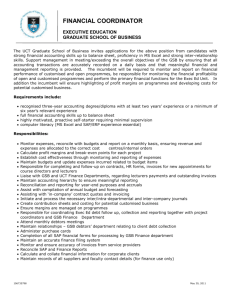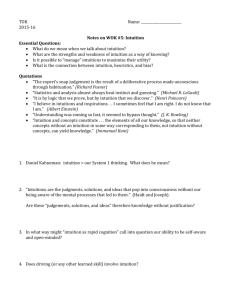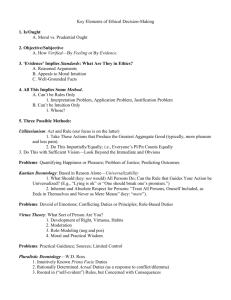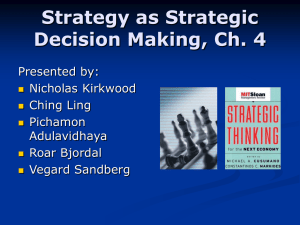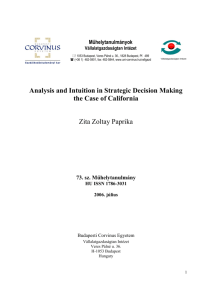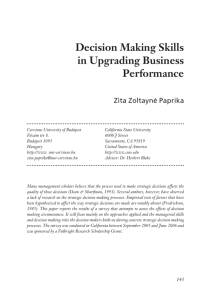Read More - Graduate School of Business
advertisement
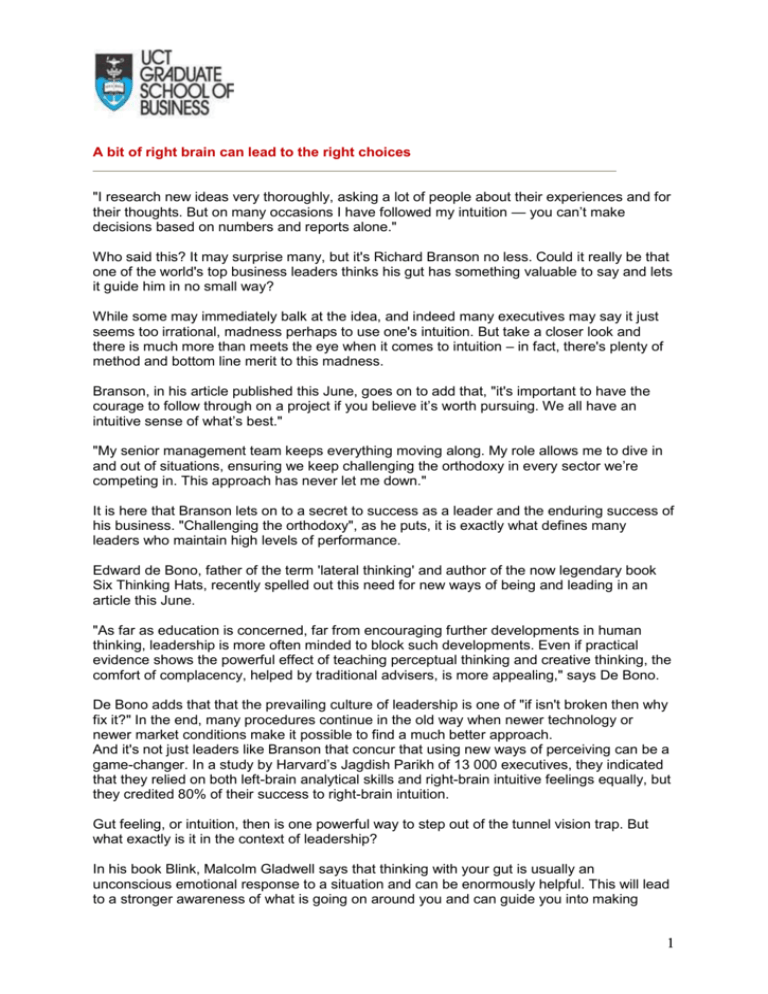
A bit of right brain can lead to the right choices "I research new ideas very thoroughly, asking a lot of people about their experiences and for their thoughts. But on many occasions I have followed my intuition — you can’t make decisions based on numbers and reports alone." Who said this? It may surprise many, but it's Richard Branson no less. Could it really be that one of the world's top business leaders thinks his gut has something valuable to say and lets it guide him in no small way? While some may immediately balk at the idea, and indeed many executives may say it just seems too irrational, madness perhaps to use one's intuition. But take a closer look and there is much more than meets the eye when it comes to intuition – in fact, there's plenty of method and bottom line merit to this madness. Branson, in his article published this June, goes on to add that, "it's important to have the courage to follow through on a project if you believe it’s worth pursuing. We all have an intuitive sense of what’s best." "My senior management team keeps everything moving along. My role allows me to dive in and out of situations, ensuring we keep challenging the orthodoxy in every sector we’re competing in. This approach has never let me down." It is here that Branson lets on to a secret to success as a leader and the enduring success of his business. "Challenging the orthodoxy", as he puts, it is exactly what defines many leaders who maintain high levels of performance. Edward de Bono, father of the term 'lateral thinking' and author of the now legendary book Six Thinking Hats, recently spelled out this need for new ways of being and leading in an article this June. "As far as education is concerned, far from encouraging further developments in human thinking, leadership is more often minded to block such developments. Even if practical evidence shows the powerful effect of teaching perceptual thinking and creative thinking, the comfort of complacency, helped by traditional advisers, is more appealing," says De Bono. De Bono adds that that the prevailing culture of leadership is one of "if isn't broken then why fix it?" In the end, many procedures continue in the old way when newer technology or newer market conditions make it possible to find a much better approach. And it's not just leaders like Branson that concur that using new ways of perceiving can be a game-changer. In a study by Harvard’s Jagdish Parikh of 13 000 executives, they indicated that they relied on both left-brain analytical skills and right-brain intuitive feelings equally, but they credited 80% of their success to right-brain intuition. Gut feeling, or intuition, then is one powerful way to step out of the tunnel vision trap. But what exactly is it in the context of leadership? In his book Blink, Malcolm Gladwell says that thinking with your gut is usually an unconscious emotional response to a situation and can be enormously helpful. This will lead to a stronger awareness of what is going on around you and can guide you into making 1 better decisions that will take you out of familiar traps. In the journal Science, a research article showed that increasingly complex decisions place increasing strain on cognitive sources. The quality of a person's decisions declines as complexity increases. Complex decisions, then, overrun cognitive powers. Henry Mintzberg, in his Harvard Business Review article 'The Fall and Rise of Strategic Planning', adds that when one gets to more senior leadership positions, the demands of strategic thinking are very different to lower levels of management. "Planning is about analysis – about breaking a goal into steps, formalising those steps, and articulating the expected consequences. Strategic thinking, in contrast, is about synthesis. It involves intuition and creativity," he writes. It's not, however, about throwing the baby out with the bathwater at executive levels. Branson emphasises the balancing act as a leader. "First, limit the downside and control the risks," he advises in his article. It's not then about left brain thinking versus right brain thinking. It's about finding middle ground between the two as a leader. It's about breaking out of the "comfort of complacency" as De Bono puts it. Doing this is no easy task, but some business schools such as the UCT Graduate School of Business (GSB) are beginning to break new ground in helping leaders to break their own barriers. The GSB is one of the first business schools in the world, for example, to offer a short-course for executives to improve their ability to grapple with complexity and improve levels or creativity through intuition. The course, running this September, aims to enhance executives' abilities to make informed intuitive decisions, explore win-win solutions, and slow down at crucial pressured moments to consider different solutions. The narrow filters through which people view the world can lead to some dire consequences – decisions based on numbers and reports alone can leave executives far too near-sighted. Looking at the recent recession, it is perhaps a consequence of short-sighted number crunching. The enduring and great leaders find that a bit of right brain can go a long way in making the right choices. Chris Breen is programme director of the short course ‘Leading with Intuition’ at the UCT Graduate School of Business in September. Email abrahams@gsb.uct.ac.za. Breen is an Emeritus Associate Professor at UCT. Jane Boxall and Michael Morgan write for the GSB. Ends Media interested in an interview or more information can contact Jane Notten or Michael Morgan on 021 448 9465 or email info@rothko.co.za. 2


